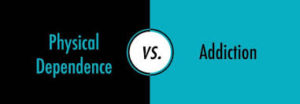Is marijuana addictive? The science says “yes” but the way cannabis is consumed says “doubtful”. So, is marijuana addictive? It all depends. The National Institute on Drug Abuse states that 9% of people who use marijuana will become dependent on it, and that number jumps to 17% when use begins at younger ages (notably, teenagers), according to the National Institute on Drug Abuse (NIDA).
Given this, should our question be: do people develop “dependencies” for cannabis? Further, how does a medical marijuana patient’s use avoid dependence or, addiction?
Dependence and Addiction: What Are the Differences?
Marijuana Dependence:
- a person feels “withdrawal” symptoms when not using cannabis
Marijuana Addiction:
- a person can not stop using cannabis even though it interferes with many aspects of their life.
 Estimates of the number of people addicted to marijuana are controversial, in part because epidemiological studies of substance use often use dependence as a proxy for addiction even though it is possible to be dependent without being addicted.
Estimates of the number of people addicted to marijuana are controversial, in part because epidemiological studies of substance use often use dependence as a proxy for addiction even though it is possible to be dependent without being addicted.
The majority of pot smokers do not develop a marijuana addiction, but some smokers (about 9%) do develop all the symptoms of an actual addiction after chronic marijuana use.
Marijuana Addiction
The fact that most users never develop an addiction doesn’t mean that it never happens. Some marijuana users will exhibit all the classic behaviors of someone who has an addiction. People who use marijuana will become dependent on it (about 17% in those who start using in their teens), according to the National Institute on Drug Abuse (NIDA).
Users who begin smoking marijuana before they reach the age of 18 are four to seven times more likely to develop a disorder compared with those who wait until after 18 to smoke, according to the NIDA
Higher Potency Factor
Cannabis is significantly more potent than it was during the NIDA studies of the 1990’s. While the average THC level in the cannabis used in the 90’s was about 3.7%, the average confiscated by law enforcement in the 10’s checks in at about 9.6%. This is a 159% increase in potency, which may be a driver behind the rising number of people who develop a dependency issue.
Marijuana Abuse v. Dependence
There is a difference between marijuana abuse and marijuana dependence. Marijuana abuse occurs when someone continues to use the drug despite negative consequences.
What kind of negative consequences are indicators of an abuse issue? Job loss, difficulties with school or even getting arrested for something related to cannabis (buying on the street, for example).
But, is it an addiction? Maybe.
Classic Addictive Behavior
When a person becomes dependent upon marijuana, then, they have a cannabis use disorder. They might display some of the classic behavioral symptoms of addiction:
- Will begin to lose control, needing increasing larger amounts
- Will spend more time thinking about using
- Will deny claims from those close to him that he has changed
- Substance use will begin to take a central role in life
- Will spend more time and money acquiring more marijuana
- Will become irritable or agitated if they run out
- As negative consequences mount, they will continue to use
The exception to this ‘use escalation’ is with Medical Marijuana, consumed with a Doctor’s recommendation, and monitored by a medical professional. When using cannabis in a clinical way, addiction and dependency are managed similarly to any prescribed medication.
Seeking Treatment
As Americans become more understanding that drug addiction is not a character flaw but, rather, a disease, they continue to have a disconnect that marijuana addiction is real. Not only are more Americans entering treatment, there’s also the issue of Cannabis Hyperemesis Syndrome.
Regardless, some argue that there is no ‘safe dosage’ of marijuana. However, no deaths due to a marijuana overdose have ever been substantiated.
How Does Marijuana Affect the Brain?
THC, the main compound in marijuana, interacts and activates brain proteins called cannabinoid receptors, which are critical in the areas of learning, memory and reward processing. It also causes the brain to release a chemical known as dopamine, which is often associated with positive emotions.
Marijuana Legalization & Public Opinion
“We have been terribly and systematically misled for nearly 70 years in the United States, it doesn’t have a high potential for abuse and there are very legitimate medical applications…the science is there. This isn’t anecdotal.” says CNN’s Dr. Sanjay Gupta.
More and more states are changing their stances on both medical and recreational cannabis use. It’s predicted that soon, cannabis could be legal throughout the United States of America.
What To Do In The Meantime
To learn more about cannabis, get up-close-and-personal with cannabis plants and learn about the cannabis industry Book a Happy Travelers Tours Adventure today!